The Holland Codes is a professional assessment tool that categorizes individuals into six types: realistic, investigative, artistic, social, enterprising, and conventional. Each type corresponds to specific career paths based on traits and interests. For instance, those with an artistic personality type thrive in creative roles, while the investigative Holland Code favors analytical positions. Similarly, the conventional Holland Code points to structured, organized professions.
In this article, our expert team will interpret the Holland Code personality system, show how it can help you identify your personality type, and connect it with relevant job options. We will explore a comprehensive career list, including Holland Code conventional careers and Holland Code investigative careers, to assist you in finding your ideal job path.
🔤 Holland Codes Explained
The concept of Holland Codes, also called the Holland Occupational Themes or RIASEC (Realistic, Investigative, Artistic, Social, Enterprising, and Conventional), emerged from the innovative mind of American psychologist John L. Holland in the 1950s. This theory revolutionized how we understand career choices by proposing that people’s professional interests are closely tied to their unique personality traits. Holland believed that an individual’s personality type could hint toward their ideal work environment and the activities they would find most fulfilling.

Let’s delve into the world of Holland Codes and discover how they can help you unlock your true potential.
What Are the Holland Codes?
The Holland Codes are a system that categorizes individuals into six groups based on their occupational preferences: Realistic, Investigative, Artistic, Social, Enterprising, and Conventional. These work personalities reflect individuals’ interests and help people identify careers that will bring them professional fulfillment.
What Does the Holland Code Test Measure?
The Holland Code Test is more than just a fun personality quiz. It helps you discover what activities and careers you might enjoy based on your unique interests. The test’s core assumption is that people are drawn to activities that align with their personality type. It has been proven to be a reliable and valid tool for assessing interests and informing career decisions.
How Do the Holland Codes Help Individuals Make Career Choices?
The Holland Codes help individuals make career choices by providing a framework for understanding their interests and aligning them with potential career paths. Once you identify the Holland Code categories that resonate most with you, you can clearly envision your career direction.
Here are the main benefits of the Holland Codes:
- Better career decision-making. By understanding your interests and strengths through the Holland Codes, you can better align your career choice with your personality type.
- Increased job satisfaction. Choosing a career that fits your Holland Code increases the likelihood of finding fulfillment and enjoyment in your work.
- Effective career planning. The Holland Codes are a roadmap for effective career planning, helping you set goals and take steps toward a dream job.
- Fulfilling work life. If your career matches your personality, you’ll likely experience less stress, better work performance, and increased motivation and engagement.
How Accurate Are the Holland Codes?
The Holland Code assessment has been tested and validated many times, indicating that the science behind it is solid. However, problems may arise when individuals misinterpret their codes or confine themselves to exploring a limited range of career options.
It’s important to remember that each person is unique, and while the Holland Codes provide valuable insights, they should not be seen as definitive or restrictive. If the results do not fully align with your interests, traits, skills, or abilities, consider retaking the test or seeking additional career guidance.
👨💼 Holland’s Personality Types
The Holland Codes categorize individuals into six personality types: Realistic, Investigative, Artistic, Social, Enterprising, and Conventional. In the following section, we explore their unique strengths and weaknesses, providing examples of famous individuals who embody these traits. Don’t miss out on our suggestions of career options that align best with each type!
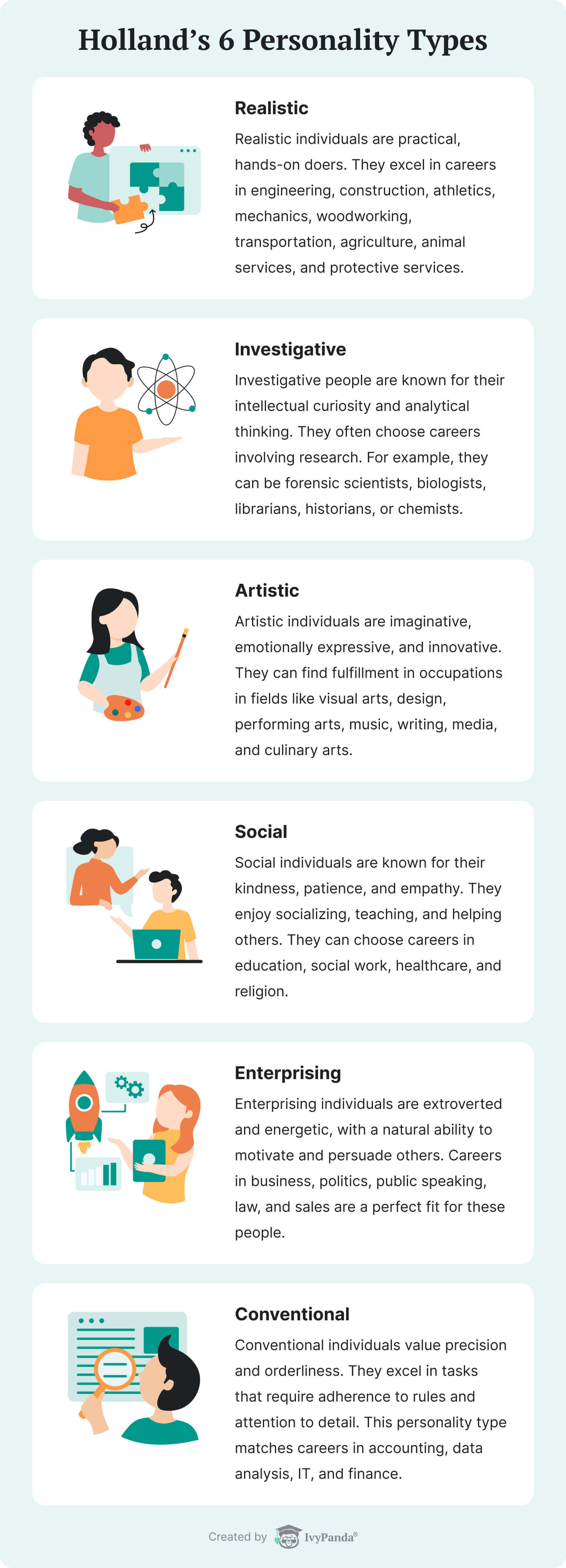
Realistic Holland Code
Realistic individuals are practical, hands-on doers. They are known for their independence, practicality, and love for working with tools and machines. These down-to-earth people excel in outdoor or mechanical settings and value tangible results.
Individuals with a realistic personality type can feel uncomfortable in social settings and perform best when alone. They prefer working with objects and animals rather than ideas and people.
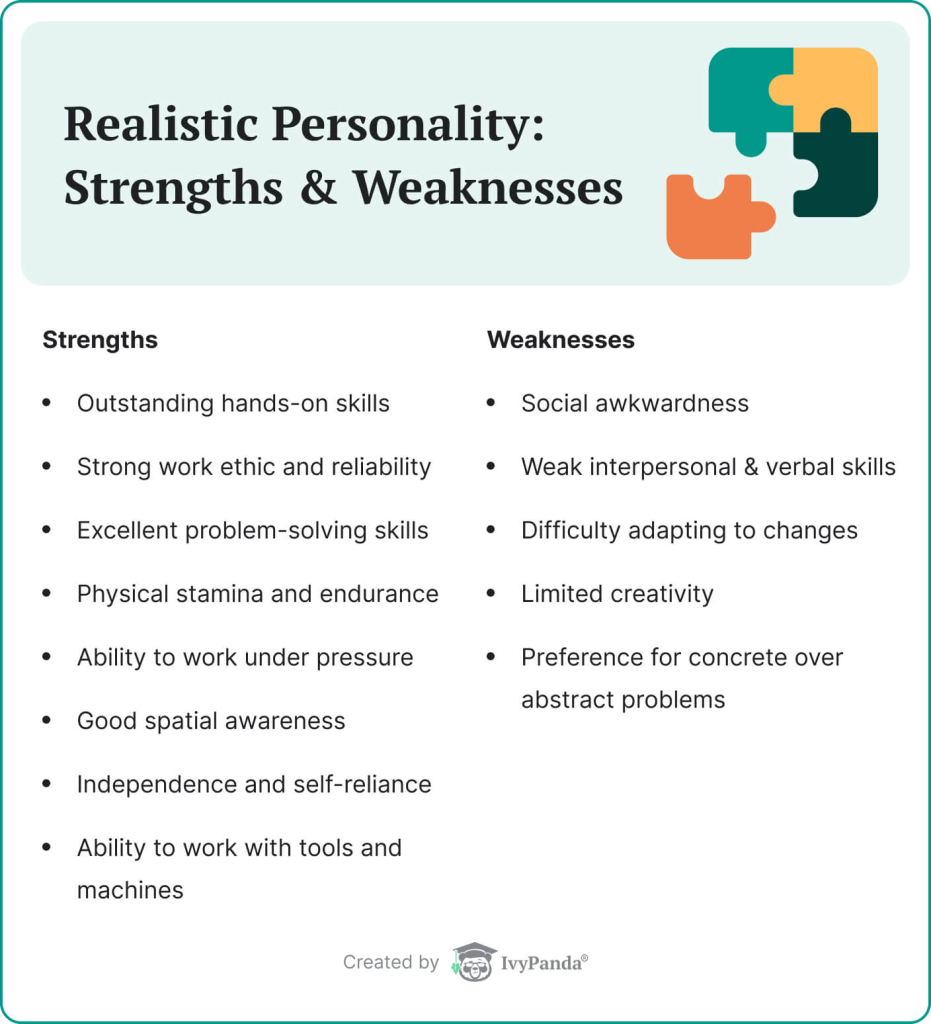
Realistic Holland Code Careers
Ideal careers for individuals with a Realistic Holland Code involve hands-on work in designing, constructing, or repairing equipment, engaging in physical activities, and working outdoors. These careers often fall within engineering, mechanics, construction, woodworking, transportation, agriculture, animal services, physical labor, athletics, and protective services.
Here are some examples of Realistic Holland Code careers:
- Mechanical engineer
- Electrician
- Carpenter
- Automotive technician
- Construction worker
- HVAC technician
- Heavy equipment operator
- Police officer
- Landscaper
- Athletic trainer
- Firefighter
- Welder
Realistic Personality Example
Have you watched a TV series titled Man vs. Wild? If you have, you might think of Bear Grylls, the host of this show, as an outstanding example of a realistic personality type. Grylls is known for his adventures and practical approach to outdoor challenges. As a realistic person, he excels in physically demanding situations. Just remember how good he is at climbing mountains, navigating harsh terrains, and surviving in the wilderness!
Investigative Holland Code
The Investigative Holland Code represents individuals known for their intellectual curiosity, analytical thinking, and love for exploring new ideas. They are often described as methodical, rational, and logical, with a strong preference for tasks that require deep thought and observation.
Investigative people thrive in environments that allow them to solve complex problems, conduct research, and engage in scientific or technical activities. These individuals perform best when working alone or with people of a similar personality type.
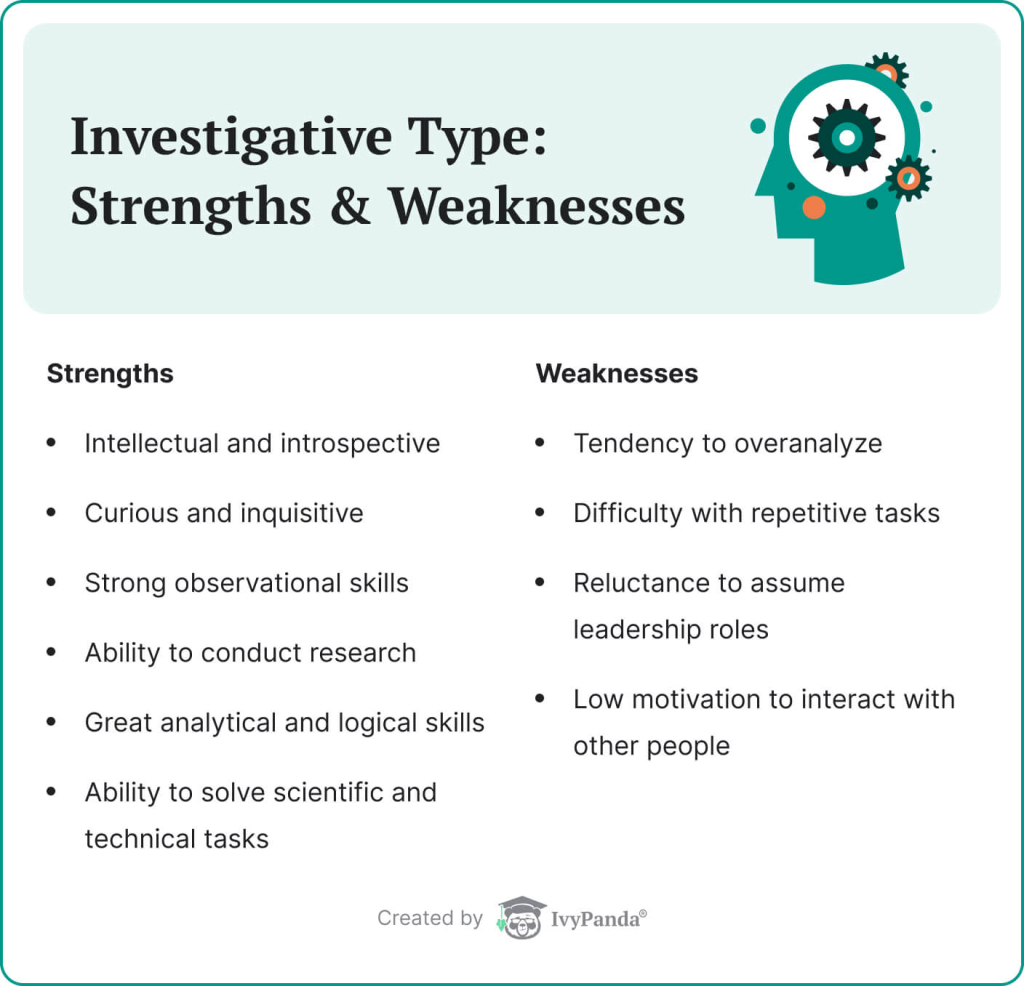
Investigative Holland Code Careers
Careers that match the investigative type involve studying and researching various aspects of the world, from non-living objects to human behavior. These occupations are often found in physical, life, medical, or social sciences.
- Here are some Investigative Holland Code careers:
- Forensic scientist
- Criminologist
- Archaeologist
- Biologist
- Epidemiologist
- Statistician
- Clinical psychologist
- Research scientist
- Historian
- Data analyst
- Genetic counselor
- Anthropologist
Investigative Personality Example
You can discover many examples of investigative personalities among scholars. One of them is Stephen Hawking, a brilliant theoretical physicist known for his groundbreaking work on black holes and the universe’s origins. His curiosity and thirst for knowledge were so insatiable that even physical challenges due to ALS did not stop him from pursuing a science career. This perfect match between his personality type and chosen career helped him become one of the greatest scientific minds of our time.
Artistic Holland Code
Individuals with an artistic personality are imaginative, emotionally expressive, and innovative. They think creatively, relying on their feelings and inspiration. Artistic people prefer to work with ideas and concepts and avoid repetitive or highly ordered activities. These individuals thrive in artistic and creative fields such as art, music, writing, design, and communication, where they can bring their unique visions to life.
Artistic people enjoy working in teams, but only if they can share their ideas and express their creativity.
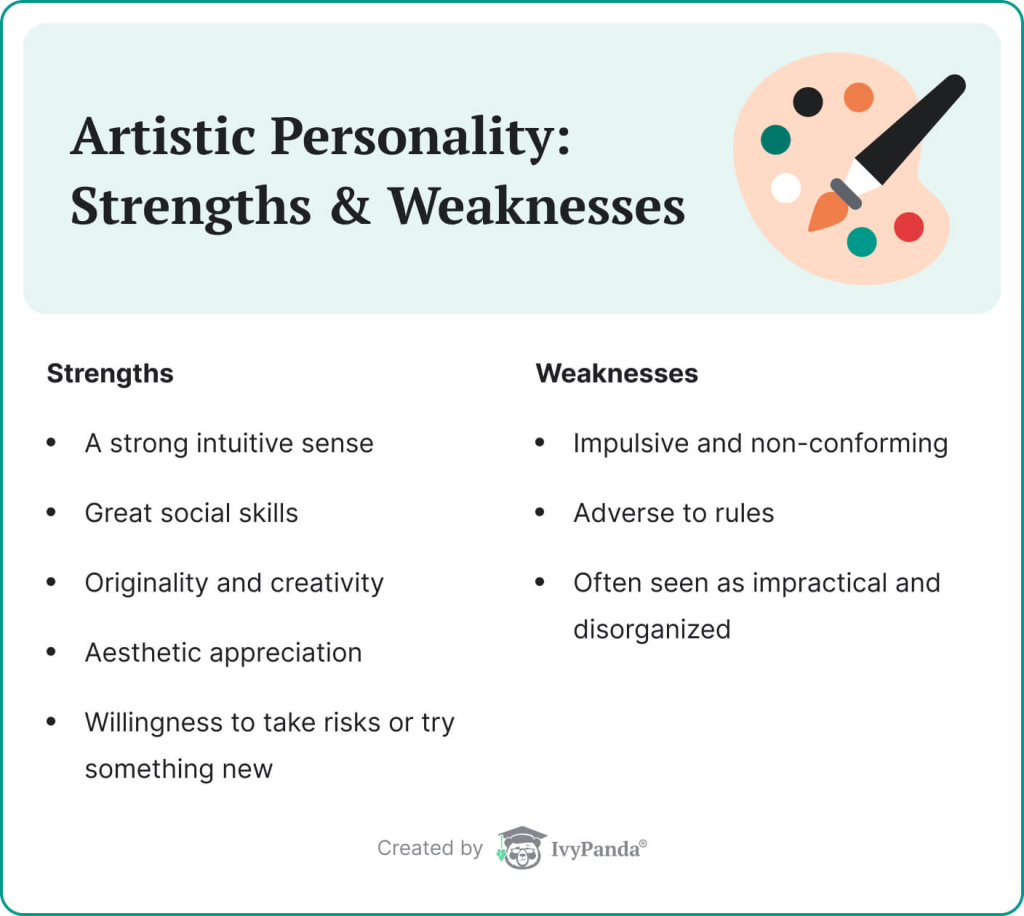
Artistic Holland Code Careers
Careers that align with the artistic personality involve producing original creative works in various forms, such as visual art, performances, writing, music, or culinary creations. These occupations let individuals express their artistic vision and originality.
Check out some Artistic Holland Code careers:
- Visual artist
- Graphic designer
- Fashion designer
- Musician
- Writer
- Actor
- Photographer
- Interior designer
- Filmmaker
- Chef
- Art director
- Makeup artist
Artistic Personality Example
Many examples of artistic personality can be found among artists, poets, musicians, playwrights, and other creative professionals. One is Pablo Picasso, a Spanish painter and sculptor. His artistic personality inspired him to experiment with techniques, styles, and narrative subjects. Thanks to his creativity and innovative mindset, we now have Cubism and collage and can enjoy thousands of his artworks.
Social Holland Code
The social personality type characterizes individuals known for their kindness, patience, and empathy. The best jobs for these individuals involve socializing, teaching, and helping others. Their focus on teamwork and building relationships makes them well-suited for humanitarian, educational, and service-oriented careers.
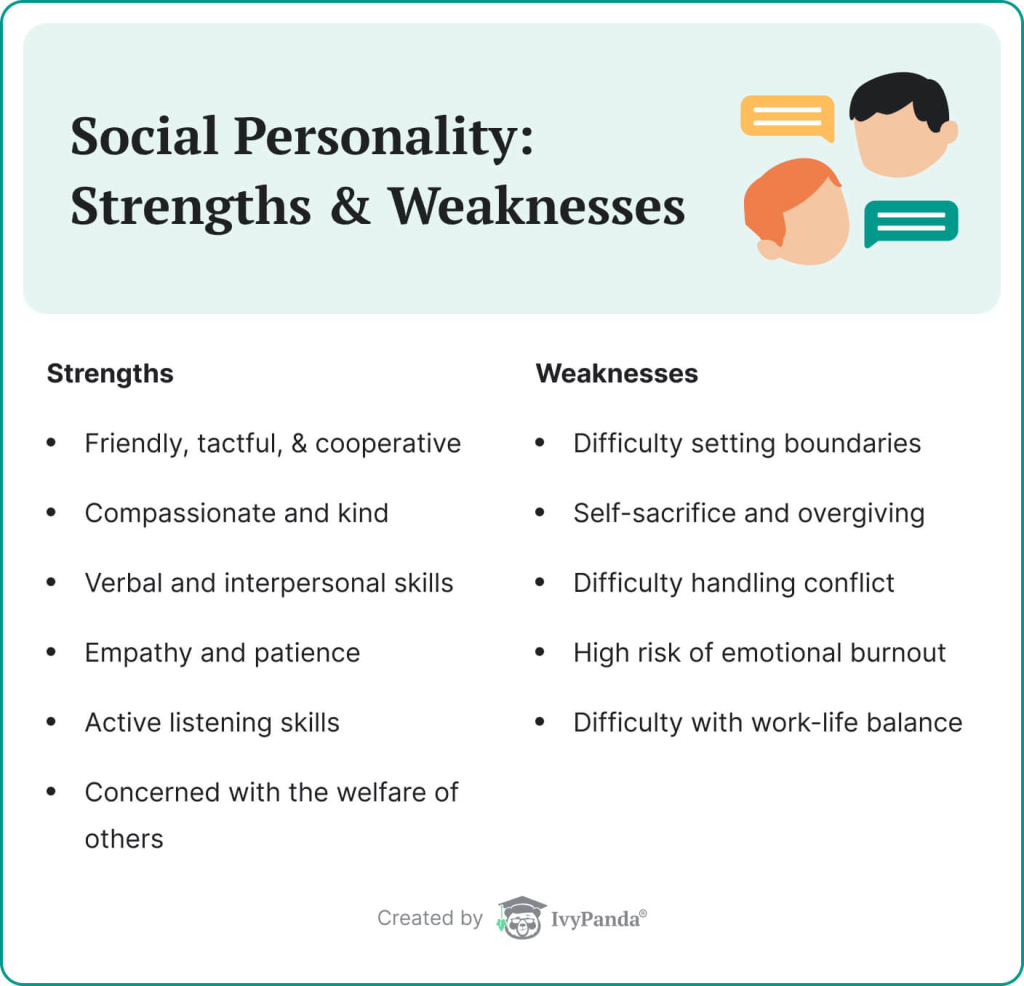
Social Holland Code Careers
Professions that align with the social personality type are commonly found in social work, healthcare, personal services, education, and religious organizations, where individuals can use their compassion and interpersonal skills.
Here are some careers for social people:
- Social worker
- Nurse
- Teacher
- Counselor
- Therapist
- Human resources specialist
- Community health worker
- Speech-language pathologist
- School psychologist
- Public health educator
- Life coach
- Nonprofit program coordinator
Social Personality Example
An outstanding example of the social personality type is Oprah Winfrey, the host of the famous The Oprah Winfrey Show. She has captivated audiences worldwide with her empathetic and compassionate nature. Through her talk show, she empowered people and encouraged them to control their lives better. She is also known for her immense charity work: her charity foundation helps build schools, serve meals, create scholarships, and establish youth centers. Her genuine efforts to help others showcase her social personality.
Enterprising Holland Code
The enterprising personality type embodies ambitious, confident, and assertive individuals. They are known for their extroverted and energetic nature, with a natural ability to motivate and persuade others. These people are good leaders and succeed in careers that allow them to be in charge and take risks.
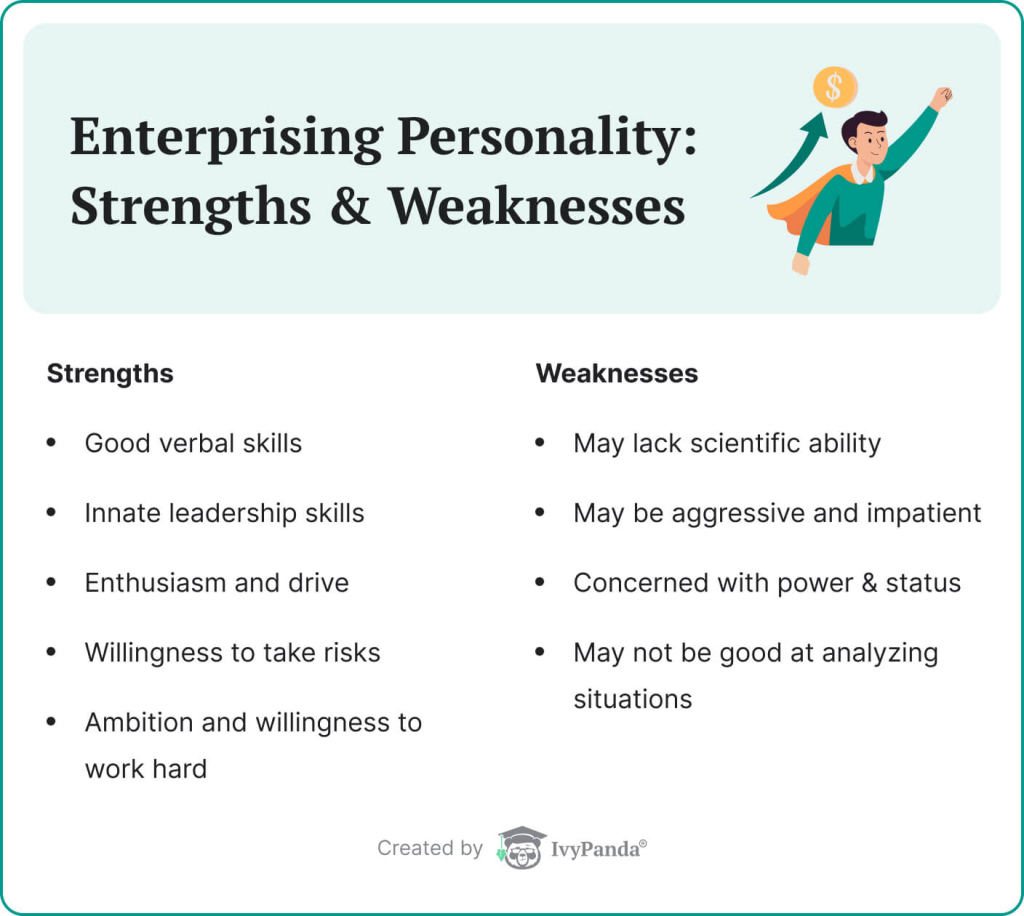
Enterprising Holland Code Careers
Professions suited for enterprising personalities revolve around strategic decision-making, negotiating, and leading within business, political, or legal environments. These individuals excel in occupations that require them to take initiative, engage in sales and marketing, or function as managers or advisors.
Some sample careers for this type include:
- Entrepreneur
- Sales manager
- Marketing director
- Public relations specialist
- Politician
- Business consultant
- Investment banker
- Real estate agent
- Event planner
- Advertising executive
- Media producer
- Sports agent
Enterprising Personality Example
Many enterprising personalities are found among entrepreneurs. And who do you think of when hearing the word “entrepreneur”? Elon Musk! Although Musk was not born a leader, his dedication and hard work have made him one of the most outstanding business leaders of our time. The founder of Tesla and Space X is known for his visionary thinking, adaptability, great communication skills, and ability to empower others. Musk’s ambitious and risk-taking personality makes him a perfect fit for an entrepreneurial career.
Conventional Holland Code
Individuals with the conventional personality type are meticulous, organized, and systematic in their approach. They value precision and orderliness, excelling in tasks that require adherence to rules and attention to detail. These individuals thrive in careers with structured work environments, such as accounting, data analysis, and administrative roles, where their logical and organized nature is a perfect fit.
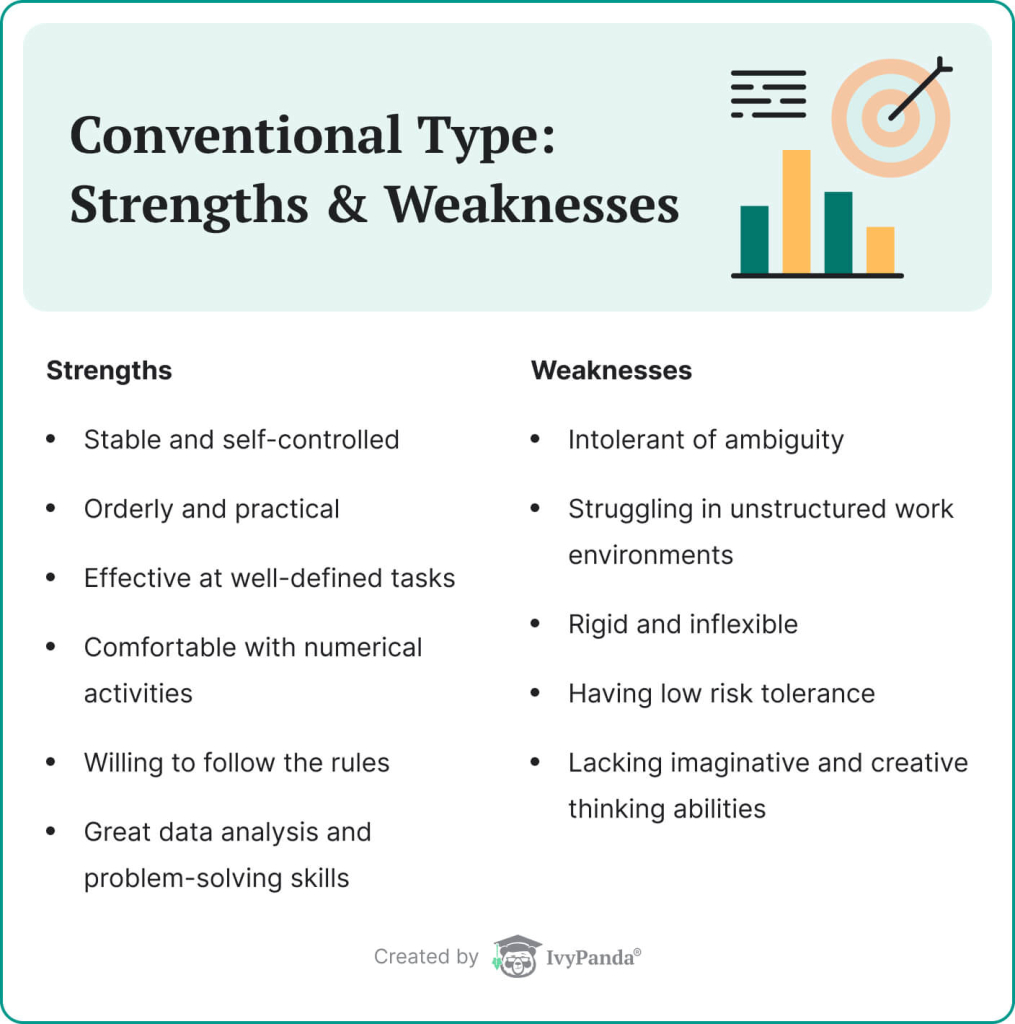
Conventional Holland Code Careers
Careers that align best with the conventional personality type require meticulous attention to detail, adherence to regulations, and organization of information. Examples involve working in office settings and using mathematics, statistics, and data management skills.
More career examples:
- Accountant
- Financial analyst
- Auditor
- Data analyst
- Statistician
- Compliance officer
- Tax preparer
- Financial planner
- Operations manager
- Payroll administrator
- Quality assurance specialist
- Inventory control specialist
Conventional Personality Example
The conventional personality type is usually found in those working with numbers. One prominent example of this personality type is Warren Buffett, an American investor and businessman. Buffett is known for his profound respect for facts. He always approached his investments logically and objectively without letting his feelings or biases interfere.
Buffett once said that to succeed in investment, one needs “the temperament to control the urges that get other people into trouble in investing.” This philosophy demonstrates his stable, self-controlled personality, characteristic of the Conventional Holland Code.
✅ How to Use the Holland Codes for Career Choice
Now that you’re familiar with all six of Holland’s personality types let’s delve into how to determine your unique Holland Code. Whether choosing a career for the first time or considering switching careers, knowing your unique blend of traits can be a crucial asset in making well-informed decisions.

1. Discover Your Holland Code
To determine your Holland Code, you can take this free online test that includes questions about your preferences in various work-related scenarios. These questions will encourage you to think about your favorite activities, environments where you feel most comfortable and productive, and whether you prefer working with people, ideas, or objects.
When filling in the test, focus on your interests rather than your current abilities or skills. It’s essential to answer based on what truly excites and motivates you, as this will help accurately identify your primary Holland Code. Note that it’s completely normal to fit into multiple categories within the Holland Code theory.
2. Interpret Your Holland Code
While your interests can align with all six of Holland’s personality types to some extent, there are usually two or three areas that attract you the most. These two or three letters make up your Holland Code.
For instance, if your code is SAR, you predominantly resonate with the social type, have some affinity with the artistic type, and relate slightly to the realistic type. The types not present in your code indicate your less dominant traits.
3. Match Your Code with Career Clusters
After determining your Holland Code, the next step is to match it with suitable career clusters that align with your personality and preferences. First, look at the table below for industries associated with each Holland interest area. Then, you can research the typical job roles within the career clusters you find interesting.
4. Dive Deeper into Career Options
After discovering your Holland Code and matching career clusters, you can use this information to research specific careers that align with your interests. One valuable resource for this research is the website O*Net OnLine.
On O*Net OnLine, you can browse careers by your personality type. Follow the link above and select the first letter of your Holland Code, which corresponds to your leading personality type.
Once you input your dominant interest, O*Net OnLine will generate a list of professions that best match your personality type. You can then explore each occupation in more detail by reviewing information such as relevant tasks, required skills, typical work activities, necessary training or education, and potential earnings.
You can add the second and third letters from your Holland Code to refine your search further and receive more tailored results. This will provide even more precise career recommendations closely aligning with your unique personality traits.
5. Explore Beyond the Codes
While the Holland Code test can suggest valuable insights, it has certain constraints. One of the main drawbacks is that it oversimplifies personality by categorizing individuals into six groups. Therefore, it may not fully cover the complexity of each person’s authentic interests. Additionally, the test does not consider specific skills, salary expectations, or personal values, which are essential aspects when picking a profession.
To go beyond these limitations, you can try other resources to help you make a conscious decision about your career path. Here is a table outlining alternative tools for exploring careers.
- VIA Character Strengths. Helps individuals detect their primary values and strengths to align with career decisions and personal goals.
- Salary.com. Provides information on salary ranges for various professions, helping applicants understand earning potential in different fields.
- CareerOneStop. Offers comprehensive career exploration tools, including assessments, job search resources, and information on training programs.
- Assessment.com. Offers career evaluation tests and instruments to help individuals recognize their interests, skills, and possible career paths.
- VolunteerMatch. Provides volunteer options based on users’ interests, skills, and location, letting students gain high-quality experience and networking opportunities.
- A Student’s Guide to a Meaningful Career. Helps students uncover their unique strengths, passions, and qualities to foster better career decision-making.
- BigFuture. Provides students with knowledge on majors, schools, financial aid, and career planning resources.
To gain a profound understanding of different professional areas, consider exploring internships, job shadowing practices, career counseling sessions, and informational interviews with experts in fields of interest.
6. Develop a Career Action Plan
The final step is to elaborate a career action plan to navigate you toward reaching your goals. Here is a short guide to help you design a working strategy:
- Assess your skill gaps. Start by assessing your skills and identifying gaps between what you already can do and what you must learn to do to qualify for your desired career.
- Set SMART goals. SMART goals are specific, measurable, achievable, relevant, and time-bound. Define clear and specific goals that outline what you want to achieve to get your dream job.
- Develop strategies. Once you have acknowledged your gaps and set SMART goals, develop strategies to acquire the essential skills and knowledge. They may involve enrolling in thematic courses, visiting workshops or seminars, seeking mentorship, or gaining practical experience through internships or volunteering.
- Make a timeline. Elaborate a timeline that depicts the steps you need to take to achieve your goals. Break down your goals into more manageable tasks with specific deadlines.
- Keep track and update. Regularly control your progress, track your achievements, and modify your career action plan as needed. Reflect on your accomplishments and fix your plan as you encounter unexpected challenges or gain new insights.
Understanding your Holland Code can be a mighty tool in leading you toward a career path that fits your interests and core drives. By identifying your Holland Code, you receive valuable insights into your personality and preferences. Therefore, you can make weighted decisions about your career choices.
The benefits of the Holland Codes theory are on the surface— it can help you find a career that not only brings you fulfillment and satisfaction but also maximizes your potential for success. You can embark on a truly rewarding professional journey by leveraging this knowledge.
If this article was enlightening for you, please share it with your friends. Let’s empower others to discover their true calling and pursue careers that bring them purpose and joy.
🔗 References
- Holland Personality Code — University of Wisconsin-Madison
- What Is My Holland Code? — Delaware Department of Labor
- Using The Holland Codes for Career Planning — Truity
- Know Your Personality Type, or Holland Code — Kansas Department of Corrections
- Holland’s Codes — MindTools
- RIASEC and Holland Codes — Indiana University South Bend
- Majors by Holland Code — University of Nebraska–Lincoln
- Explore Your Holland Codes — University of Houston
- Holland’s Occupational Themes — University of California, Davis
- Holland Hexagon — Purdue University
- Holland Interest Themes — The University of Oklahoma
- Holland’s Personality Life Styles — Central Michigan University

![How to Get Funding for Projects: Research Grants for Students Explained [2026]](https://ivypanda.com/blog/wp-content/uploads/2021/09/happy-young-asian-businessman-businesswoman-meeting-brainstorming-some-new-ideas-about-project-309x208.jpg)

![How to Write a CV: 11 Useful Tips [Infographic]](https://ivypanda.com/blog/wp-content/uploads/2020/11/company-human-resource-hr-is-holding-resume-application-tablet-hand-309x208.jpg)